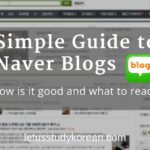[Vocabulary] 팔짱을 끼다
팔짱을 끼다 (pal-jjang-eul ggi-da) – link arms with (somebody)/fold or cross one’s arms If you realise, there are two (quite) different meanings to this phrase. This phrase is a little tricky because it depends very much who your subject(s) is(are).…




